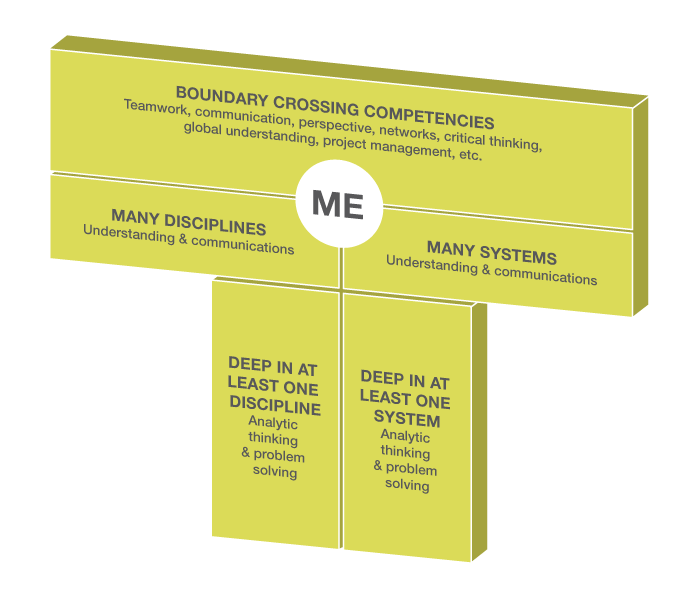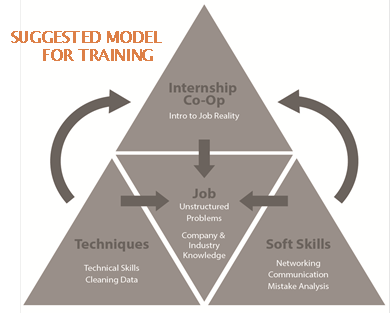The rise of “knowledge-based” businesses is fueling demand for a new type of employee.
As you prepare to enter the workforce, you’ll see that organizations ideally want to hire employees with specialized technical knowledge, but who can also think broadly across disciplines, and apply their knowledge to new settings. These people are known as “T-shaped” workers – someone whose skills and knowledge are both deep and broad.
The concept of T-shaped skills or T-shaped persons is a metaphor used in job recruitment to describe the abilities of persons in the workforce. The vertical bar on the T represents the depth of related skills and expertise in a single field, whereas the horizontal bar is the ability to collaborate across disciplines with experts in other areas and to apply knowledge in areas of expertise other than one’s own.
Employees that combine these skills with the ability to communicate information effectively, network, and manage projects gives companies a distinct competitive advantage. This interdisciplinary approach of mixing technology with soft skills works across even the most disparate industries.
How can students gain T-shaped skills?
Here are some of the things you can do while attending Bentley to help gain these essential T-shaped skills:
- Strive for a mix of industry and university training. In addition to your regular classwork, speak to people in your industry and attend lectures or seminars by those working in your field.
- When choosing classes, develop your in-depth skills and knowledge in core topics, and complement that with a breadth of expertise across a range of relevant disciplines.
- Mentoring and internships are critical to developing more employable and T-shaped graduates. Network with Career Services, friends, and family to see what’s available.
- Is there an on-campus program for students returning from internships to share their job experiences? If not, perhaps this can be formalized within Career Services, or as part of a club.
- Recent graduates should also be encouraged to come back and give presentations to current students, sharing their insights and experiences. By sharing their knowledge, recent graduate hires could be corporations’ and universities’ best source for improving understanding and partnerships.
- Finally, once in the workforce, it is important to gain mentors and to reach out to them to gain broader skills and for support.
T-shaped skills can be built on a university foundation with an interdisciplinary focus. Internships, part-time and summer jobs give you a chance to acquire real-world experience. After graduation, you’ll continue to gain stills through professional training and mentoring, which provides the specific in-depth knowledge about the company and its business. Each element builds on and reinforces each other.
To be successful in today’s workplace, you must be collaborative and conversational across all departments, skill sets and geographies. You must also be able to quickly adapt to change. In summary, employers are looking for graduates with T-shaped skills for their next hires.
About the Author
Patricia “Trish” Cotter is a high-tech leader and seasoned business executive. She recently completed her doctorate in work-based learning at the University of Pennsylvania. Visit her blog at www.trishcotter.com or email her at patricia.cotter@comcast.net.

 |
|




